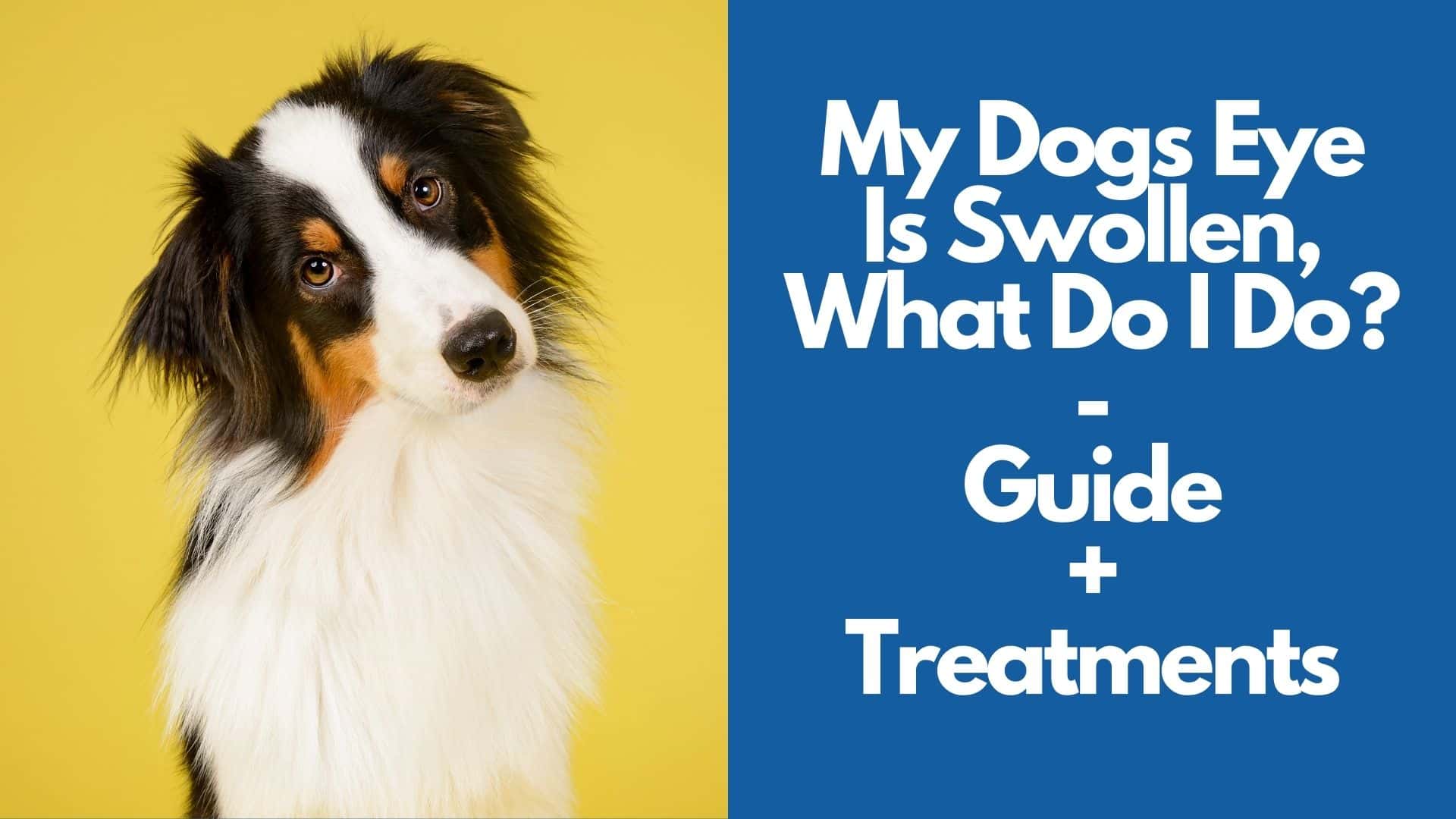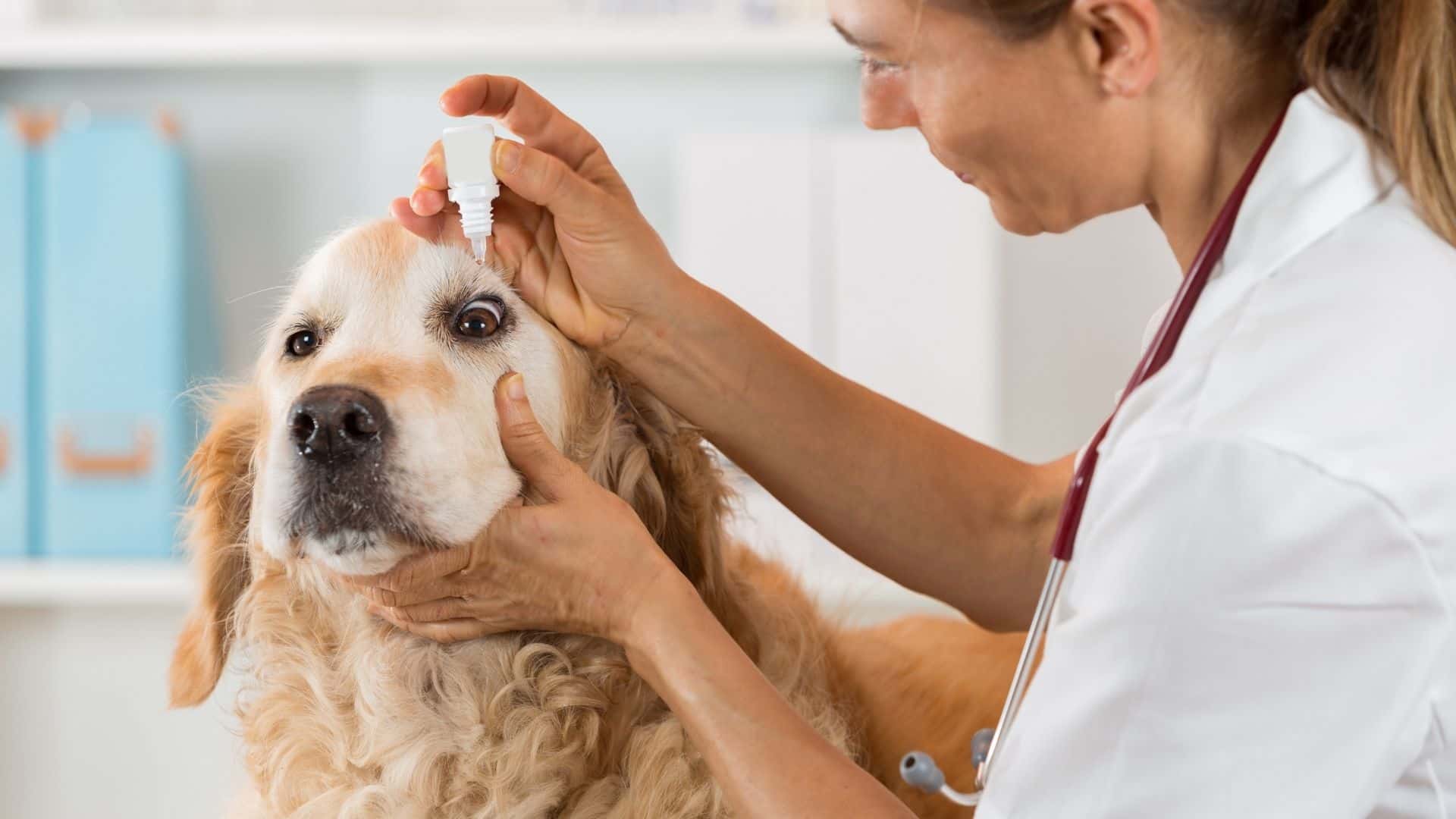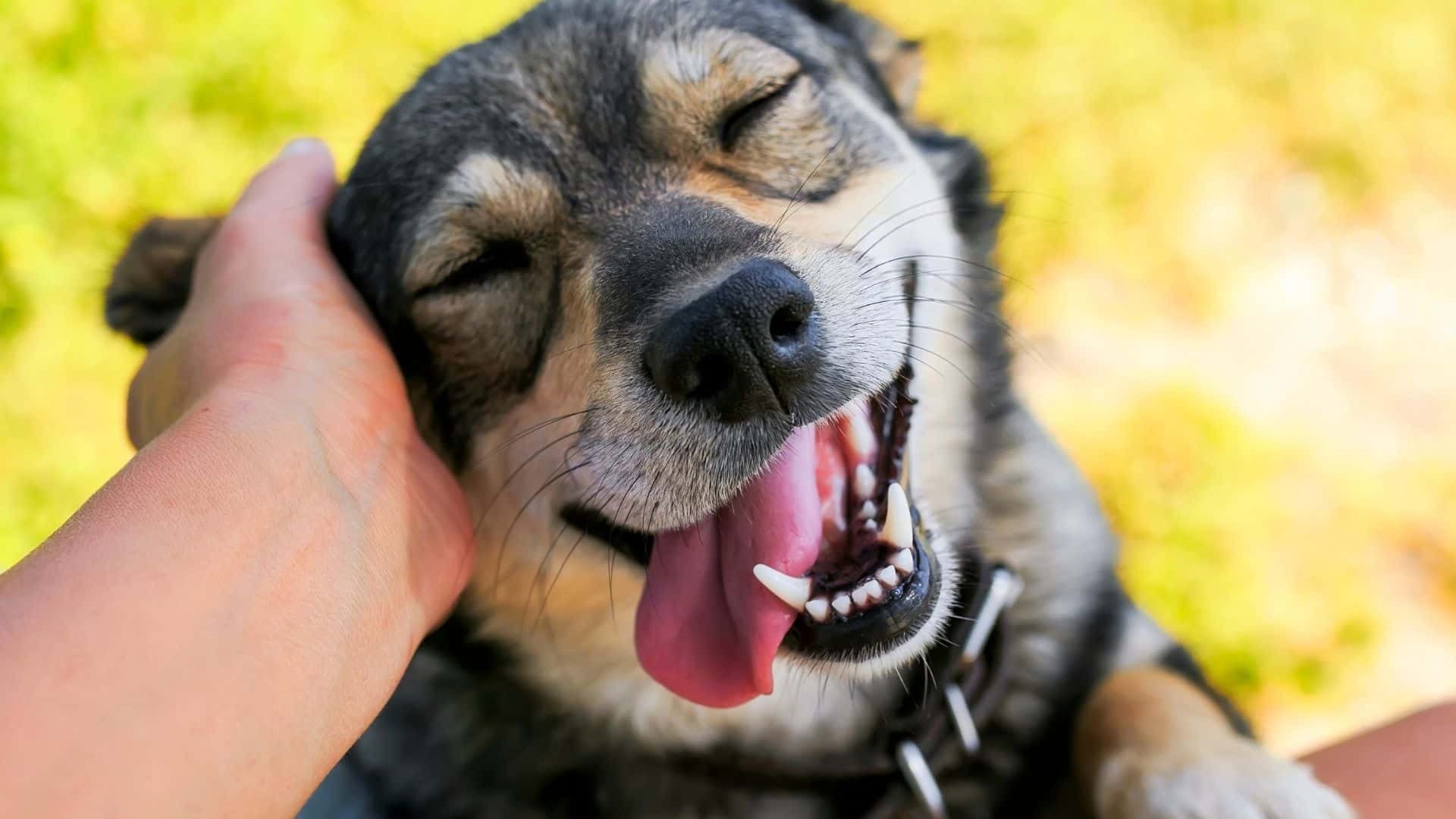It’s always upsetting to see your dog in agony, but eye infections are particularly distressing. Itchy, puffy, red, and watery eyes will make you want to cry.
Even before we go into what can be wrong and how to address these problems, you should know that the first thing you should do if your dog has swollen, red eyes is call your veterinarian to make an appointment. The swelling around the eye should be addressed immediately for a variety of reasons, and some of these can result in permanent loss of eyesight.
Swollen eyes in dogs can be caused by a variety of conditions, including allergies, glaucoma, or tumors, both benign and malignant. There are various causes of dog eye swelling, but whatever the severity, it should be treated as soon as possible to avoid any future problems.
As soon as your dog’s eye (or eyes) swells, call your veterinarian right away.

Let’s start,
What is swollen eyes in dogs?
There are two main causes of conjunctivitis (swelling of the eyelid lining): irritants in the environment or infections in the eyes. When the tissue covering the eye is inflamed, conjunctivitis occurs. Conjunctivitis frequently manifests as swollen eyes in dogs. It is possible to have conjunctivitis in one or both eyes.
Both eyes are generally impacted and enlarged while suffering from a viral or bacterial infection. If the irritant gets into the eyes, it might impair one or both of the eyes. Check for the following symptoms to see if your dog has conjunctivitis:
- Eyes that are red or swollen
- Blinking repeatedly
- Squinting
- Sneezing
- Nasal congestion and discharge
- An increase in the amount of redness around the eye’s surface
- Withdrawal and inactivity are examples of behavioral changes.
- A discharge of mucus or pus from the eyes
Conjunctivitis comes in various forms. Allergic conjunctivitis is not communicable to other dogs and usually occurs in the spring and fall. It’s frequently brought on by dust or pollen in the environment. Virus-induced conjunctivitis can last up to a month after the initial illness has been treated. It can spread quickly from dog to dog. Infectious bacterial conjunctivitis can spread quickly from person to person.
You will be asked to bring your dog immediately along if you call the veterinarian clinic and say, “My dog’s eyelids are swollen shut.” It’s important to take your dog to the vet right away if you notice your dog’s eyes have gotten swollen. Despite the fact that ocular edema can be caused by allergies, insect stings, or an injury to the eyelid, it is critical that your veterinarian look for other symptoms in order to rule out certain medical disorders.
Treatment for your dog might range from something as simple as antibiotics to something as complex as surgery. If left untreated, a swollen eye can grow quickly and permanently impair one’s ability to see. The following factors can contribute to this excruciating condition:
- Conjunctivitis
- Glaucoma
- Unknown substance
Blepharitis, or swollen eyes in dogs, is a medical ailment that causes your pup’s eye(s) to appear puffy, inflamed, or infected. It’s worrisome to see your dog’s eyes suddenly swollen, and you should visit your veterinarian as soon as you discover any signs.
If your dog appears to have swollen eyes, there could be a number of causes for this. It could be anything as simple as dust in your dog’s eyes causing irritation, or it could be something more serious, such as an allergic reaction that is potentially life-threatening.
Eyelid blepharitis is more common in dogs with particular characteristics, such as facial folds or inwardly-pointing eyelids.
To ensure that your dog’s visual problem is correctly diagnosed and treated, be sure to communicate any additional symptoms you’ve noticed in your pet to your veterinarian. Swollen eyes in dogs can have a variety of reasons and treatments. Here’s what you need to know.
Why is my dog’s eyes swollen?
Swollen eyes in dogs can be caused by a variety of infections, much like in humans.
Soap or smoke can cause it as well as foreign stuff invading from the outside, like dust, hair, and grass. Other viruses that can cause eye infections include canine influenza, canine distemper, herpes, hepatitis, and herpes simplex. Swollen eyes can be caused by fungi, parasites, or any number of other things.
Tick-borne disorders like Lyme disease, leptospirosis, or canine brucellosis can all cause eye infections due to bacteria. The swelling in the eye might be caused even by a small cut or scrape on the eye that is healing.
Blepharitis can affect one or both of your dog’s eyes and refers to enlargement of the eyelid tissue and surrounding area.
If left untreated, your dog may scratch or paw at their eyes in an attempt to find relief, which may result in further injury to the eyelids and surrounding tissue. This is why seeing your vet as soon as you discover puffy eyes in your dog is critical.
When your dog has conjunctivitis, they may paw at their eye, blink, or squint. You may also see a clear or green discharge from your dog’s eye, as well as redness and swelling around the eyelids, whites of the eyes, or the area surrounding the eye.
When allergies or a viral infection are to blame, conjunctivitis often begins in one eye and quickly spreads to the other. However, in certain situations, both eyes may be afflicted from the get-go.
Consult your veterinarian right once if your dog is displaying symptoms of conjunctivitis, no matter how minor they appear to be. Conjunctivitis, if left untreated, can permanently damage the eyes.
Dog bites and dental issues are two common causes of facial edema in dogs. Swelling can be a minor reaction or something for which you need immediate medical attention.
If you want to keep your cat healthy and pain-free, you should be aware of the symptoms of facial swelling and what to do if it occurs.
If your dog’s eyes are red and swollen, she may have a condition known as blepharitis, an inflammation of the eyelids. We’ll go over the symptoms, causes, and treatments for blepharitis in this article so you can get your pet the help she needs to heal.
When the eyelids of dogs become inflamed, it can spread to other tissues around the eye, including their meibomian glands. Not only is this uncomfortable, but it’s serious enough that your dog’s vision may be at risk if it isn’t caught and treated in time.

What are the causes of swollen eyes in dogs?
Let’s take a look at few causes of swollen under eye in dogs:
1. Glaucoma
A medical disorder called glaucoma is caused by an inability of the eye’s aqueous fluid to drain properly, as opposed to an excessive production of fluid. Primary glaucoma and secondary glaucoma are the two types of glaucoma.
Primary glaucoma develops when the pressure inside a normally healthy eye becomes abnormal. The Basset Hound, Beagle, and Cocker Spaniel are among the breeds that are prone to glaucoma if they are exposed to it.
Underlying problems in other dogs can contribute to fluid buildup, such as inflammation, trauma, and abnormalities in the eyeball. When normal drainage is disrupted, the liquid begins to build up in the eyes, increasing the pressure. If your dog isn’t treated by an emergency veterinarian for the eye pressure, he could go blind permanently.
2. Uveitis
Uveitis is an inflammation of the iris, ciliary body, and choroid in the eye’s interior. This is a more serious infection of the eye, and it’s usually the result of something external to the eye, such a tick-borne disease, a virus, or even cancer.
Even a minor injury or trauma can cause the eye to enlarge naturally as a natural response. These include things like being bitten by another animal in the eye, having dirt or dust blown into the eye, and even getting stung.
3. Allergies
Dogs, like people, might be allergic to certain substances, foods, plants, spider bites, bee stings, medications, or vaccines. If your dog’s face is swelled, if they have difficulties breathing, if their gums are purple or blue, or if they pass out, take them to the vet right away if they have a severe allergic response that results in throat swelling and cuts off their windpipe.
Immunotherapy may comprise an antihistamine, steroid injections or topical antibiotics ointments in addition to a particular diet and skin or blood tests. Epinephrine may be administered in severe situations.
4. Injury or infection
An injury or infection to the dog’s eye can lead to painful open sores on the cornea known as corneal ulcers. Urethral erosions damage the cornea more deeply than abrasions, resulting in edema, redness, and even tearing in some cases.
5. Poisoning or other issues
Other causes include dry eyes, vitamin insufficiency, tumors, poisoning, issues with the tear ducts, or deformities of the eyelids such as entropion (drooping of the upper eyelids) (rolling in of the eyelids). This is why consulting with a veterinarian is so critical. Eye swelling in dogs can have a wide range of causes, and diagnosing it on your own can be difficult.
What are the treatments for swollen eyes in dogs?
Swollen eyes in dogs can have a variety of causes, so be sure to have your vet check them out. Your veterinarian will be able to prescribe the best course of action if you provide him or her this information ahead of time.
1. Eye drops
Eye drops for conjunctivitis are a simple therapy for swollen eyes, but glaucoma, which causes increased pressure in the eye, may necessitate emergency surgery.
2. Hygiene
Swollen eyes in dogs can’t always be prevented, but following a few simple hygiene practises can help to reduce the likelihood that your dog develops the condition. If your dog has a history of eye problems, make a point of cleaning their eyes with an irritant-free eye wash on a frequent basis.
3. Ask your vet
If your dog’s swollen eyes are the result of an allergy or infection, make sure you give him the treatment he needs as directed by your veterinarian. Additionally, keeping your dog’s environment clean helps keep his eyes free of foreign items or irritations.
You must have your dog checked and treated as soon as they acquire inflamed eyes. Medical conditions and symptoms can be properly diagnosed and treated by your pet’s veterinarian. It’s critical to be able to tell your veterinarian how long your dog has had swollen eyes and to provide as much detail as possible.
Your dog will be examined physically by your veterinarian. A liquid anesthetic will be injected into the eye by your veterinarian to relieve any pain and look for any symptoms of damage or conjunctivitis. Corneal injuries can be detected with the help of a fluorescent stain. The vet can remove anything that’s lodged under the eyelid, including foreign objects.
4. Antibiotics
If your dog has allergic conjunctivitis, antihistamines might be provided to lessen the inflammation. If your dog has a bacterial or viral infection, medications and eye drops can be used to treat the symptoms while also eliminating the source of the problem.
If the conjunctivitis is due to a fungal infection, a prescription for an anti-fungal ointment may be issued. If an abnormality is to blame for the problem, corrective surgery may be a possibility to fix it.
5. Patience
If your dog is suffering from glaucoma-related swelling of the eyes, time is of the essence. To prevent blindness, the pressure inside the eye must be reduced as soon as possible.
Prescription medications are available to assist reduce ocular fluid production and promote drainage. In order to limit the danger of injury to the eye, these drugs are used to manage the elevated pressure there. Additionally, analgesics may be administered to ease your dog’s discomfort and pain.
6. Surgery
A veterinarian may recommend surgery if normal treatments are not helping your dog’s condition. If your dog is already blind and other treatment options have failed, surgery may be an option. It’s possible your veterinarian will suggest having the eye removed to alleviate your dog’s discomfort.
Watch Four signs of pain in the eye of a dog | Video
What is the best way to deal with a dog’s swollen eye?
If your dog has a history of eye problems, make a point of cleaning their eyes with an irritant-free eye wash on a frequent basis. If your dog’s swollen eyes are the result of an allergy or infection, make sure you give him the treatment he needs as directed by your veterinarian.
What does under eye swelling indicate?
Swelling under the eyes can be caused by a variety of illnesses, ranging from the moderate to the severe, such as allergies or blocked tear ducts. People who have swelling behind their eyes and are having trouble breathing or are in great discomfort should seek medical attention right away.
Is there a treatment for canine blepharitis?
Blepharitis usually goes away on its own when treated properly. If allergies are at blame, your dog may experience blepharitis flare-ups until the allergy problem is resolved.
How contagious is a dog’s eye irritation to humans or to other pets?
Humans are susceptible to blepharitis, which has been related to conjunctivitis (although the two are completely separate conditions and are treated differently). The risk of contracting blepharitis from an infected dog is low for humans and other animals.
Without visiting to the veterinarian, how can I treat my dog’s eye infection?
Even if your dog already has an infection, home remedies like non-medicated sterile saline rinses can help flush the eye. If you only have a small amount of clear discharge and slight redness, saline rinses are the way to go.
Conclusion

If you notice anything amiss with your dog’s vision, don’t hesitate to call your veterinarian right away. Swelling that appears to be minor can sometimes develop to more serious problems that could have been handled more simply if discovered sooner.
Make sure your dog is mending properly by keeping an eye on their health. If your pet becomes infected, or if their symptoms worsen or persist for a lengthy period of time, call your veterinarian right away.
If you have any worries about your pet’s health or well-being, don’t hesitate to seek professional aid.
Bottom up
So, I hope you got the full idea on My Dog’s Eye Is Swollen, What Do I Do? | Guide + Treatments.
Please comment below about your ideas and share this “My Dog’s Eye Is Swollen, What Do I Do? | Guide + Treatments” article with your friends.
Stay tuned with our website to find out more exciting stuff. Don’t forget to check out our previous articles too.
Until the, Read about, What Does Dog Under Control Mean? | Guide to Control






